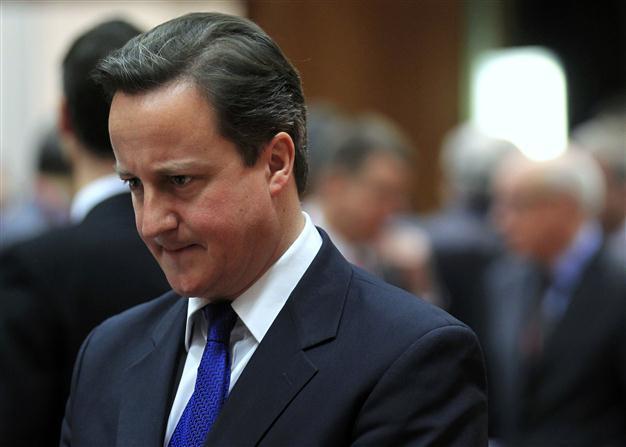With friends like these: British PM in Europe balancing act
BRUSSELS - Agence France-Presse

Britain's Prime Minister David Cameron attends a European Union summit in Brussels January 30, 2012. REUTERS Photo
A month after he became the lonely man of
Europe, British Prime Minister David
Cameron's efforts to win friends and influence people met with mixed results at the latest summit in Brussels.
He won a new ally when the Czech Republic joined Britain on the outside of a fiscal treaty signed by the rest of the European Union -- but then found himself embroiled in a spat with an old ally, French President Nicolas
Sarkozy.
Cameron is also on a political tightrope between the
EU, Britain's biggest export market, and his own party in Britain which wants him to take a tough stance against the bloc or even leave it altogether.
So, it was not the firebrand Cameron of December on show Monday but a more subdued figure keen to appease other leaders -- and receiving a kiss on the cheek from German Chancellor Angela Merkel for his pains.
He kept up his rhetoric about ensuring that Britain's interests are not hurt by the new treaty.
"We will be watching like a hawk," he said, reiterating calls for eurozone countries to recapitalise their banks, deal with Greece's debt drama and establish a financial "firewall".
Cameron also insisted that he had kept Britain out of a treaty that it did not need or want.
He received some vindication for his stance when the Czechs decided that they too could not endorse the fiscal pact.
But he had already backed down on an earlier threat made in December to veto the use of EU institutions by other countries that join the pact.
He had also softened his language from the previous week, when he launched a stinging attack on his EU partners, slammed the eurozone as uncompetitive and branded as "madness" a planned transaction tax.
Cameron had also picked a fight over the European Court of Human Rights last week, saying it needed urgent reform to stop it overriding the decisions of democratic member nations.
Tensions rose to the surface again when Cameron and Sarkozy took digs at each others' countries.
First Sarkozy said in a speech on Sunday that Britain had "no industry" left.
That prompted Cameron to say that the French president's "mad" plans for a financial transactions tax would drive French banks over to Britain.
"In the spirit of this healthy competition with
France, if France goes for a financial transactions tax then the door will be open and we'll be able to welcome many more French banks, businesses and others to the UK," Cameron said.
But asked if he would be backing the French president's re-election this year -- as Merkel's party said she would -- Cameron tried to play it down lightheartedly.
"I am a big supporter and friend of Nicolas Sarkozy and I wish him well," he said.
"Every now and again he says something I don't agree with -- today when he said that Britain is short of industry, we actually have a larger industrial sector than France." Relations have been stormy between the two in recent months.
In December when Cameron criticised the eurozone's efforts to tackle its debt crisis, Sarkozy reportedly snapped that -- as Britain is not part of the single currency -- Cameron should shut up.
Cameron's problem is that what offends in Europe plays well at home, and vice-versa.
His self-proclaimed use of Britain's "veto" in December to stay out of the fiscal pact delighted the anti-European wing of his party, which he needs to keep the Conservatives at the head of a coalition government.
They now fear he is backing down.
Iain Duncan Smith, a senior cabinet minister and former leader of the Conservative party known as a strong "Eurosceptic", issued a veiled threat at the weekend when he said he trusted Cameron to uphold his veto pledge.
Cameron was expected to face more sniping from Eurosceptics when he gives a statement to parliament on Tuesday.
The leader of the main opposition Labour, Ed Miliband, said the latest summit proved Cameron had lost the opportunity to defend Britain's interests in negotiations when he walked out of talks on the new treaty last month.
Miliband told Sky News: "If you walk away from the negotiating table, it is very hard to secure a good deal for your country.
David Cameron,
